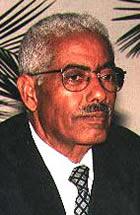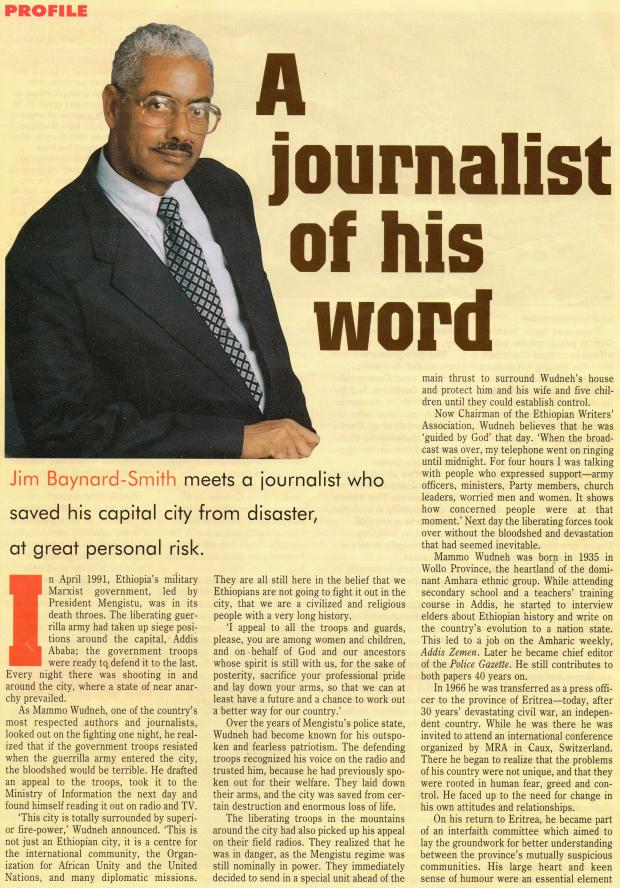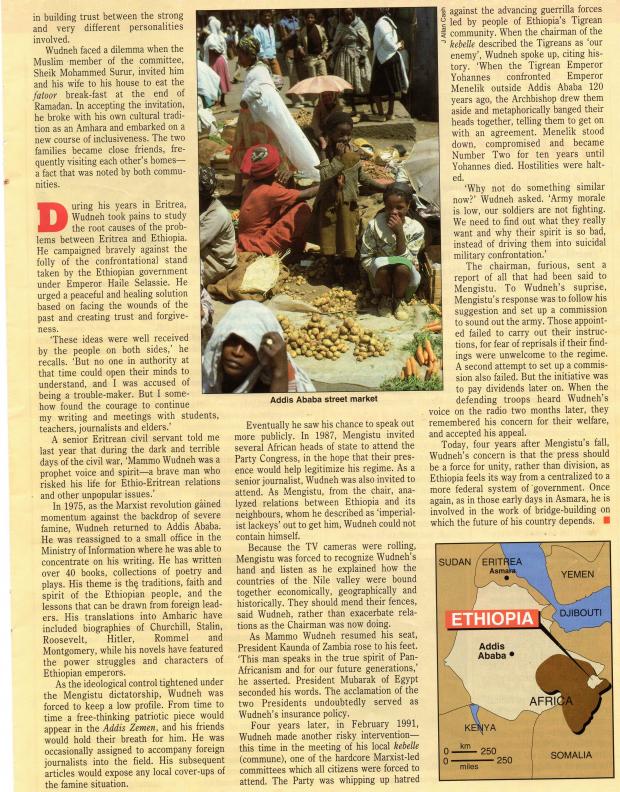 The renowned historian, journalist and author Mammo Wudneh, a member and friend of IofC Ethiopia, died on 2 March, at the age of 77. He was buried the following day, in Addis Ababa, Ethiopia.
The renowned historian, journalist and author Mammo Wudneh, a member and friend of IofC Ethiopia, died on 2 March, at the age of 77. He was buried the following day, in Addis Ababa, Ethiopia.
Mammo Wudneh published 53 books and eight plays in Amharic (original and translations). He entered first grade at the age of 15 but, unable to complete even high school due to hardship, he went on to work on several newspapers in Addis Ababa and Asmara and has been in the writing business for over 54 years.
Mammo has been a prominent member and leader of Initiatives of Change Ethiopia since the 1960s and has actively participated in peace building initiatives in Ethiopia and the Horn of Africa.
Extract from Forgiveness: Breaking the Chain of Hate (pps 104-6 Grosvenor Books, London) by Michael Henderson
Mammo Wudneh is president of the Ethiopian Writers Union and a respected historian with more than 40 books in print. He has been working to resolve tension and end fighting between Ethiopia and Eritrea. He told a 1998 conference in Europe that he was concerned that both sides were purchasing expensive weapons from eastern Europe, Asia, and maybe, he said, western Europe as well. He feared that the conflict could widen and affect the neighboring countries, endangering stability in the Horn of Africa:
'It is very unfortunate that as we are gathered here to find the best ways for peace, two countries which are in many ways sisters are immersed in the tension of conflict with each other. When will the human person learn that violence is not the answer and never will be? Are not so many human lives which may easily be lost in war more important than the border? Armed conflict is an evil potential that could leave countless people killed, maimed, orphaned and homeless.'
Wudneh appealed to the two countries – and indeed, all countries in conflict – to stop all forms of hostility and violence. He urged those present to enlist their countries in this peacebuilding effort. Already two months earlier Wudneh had gathered the different religious leaders of his country, from the Christian, Muslim, and other faith communities, for an interfaith peace meeting chaired by the patriarch of the Ethiopian Orthodox Church. He reported that a permanent committee composed of these leaders had been established and was active.
In taking these initiatives and launching an appeal to the world Wudneh was building on earlier experiences in his own life. During World War II, his parents and relatives were killed when the Italian Fascist Air Force bombed his village. Thirty years later, he met an old man who proudly told him that he was a pilot at the time of the Italian occupation of Eritrea and that he had bombarded Wudneh's village. Wudneh says that he shivered and became furious and went to his room to get a pistol so he could take his revenge. 'Yet, my conscience forced me to think twice,' he says. 'I then begged God to show me the right direction and help to guide me. The answer came, if I killed the Italian Fascist, would my parents and relatives be alive? At a time when people all over the world forgive the past wrongdoing and live in peace with tolerance, if I killed an old man, does this not mean repeating the same mistake committed by Mussolini?'
The Ethiopian writer thought it over. The next day he went back to the bar where he had met the pilot and told him his story. 'He was shocked, he was trembling thinking I was going to take revenge on him. I told him that I forgive him. "I am sorry, sorry, please forgive me," he replied, and they embraced. I also kissed him,' says Wudneh.
Wudneh is a courageous man. During the reign of Emperor Haile Selassie, he spoke against policies he felt were wrong. During the civil war between Ethiopia and Eritrea, he risked his life for Ethiopian-Eritrean relations. And in 1987, when dictator Mengistu Haile Marian invited several heads of African states to attend his party congress, Wudneh got up and opposed him. As the writer resumed his seat, the president of Zambia, Kenneth Kaunda, rose to his feet and said, 'This man speaks in the true spirit of pan-Africanism and for our future generations.'
Read article in For A Change magazine 'So You are the One Who Destroyed My Village' about Mammo Wudneh
For a Change magazine also featured another about Mammo Wudneh, written by Jim Baynard-Smith, entitled 'A journalist of his word'. The text is contained in the following two images. Download the two images here and here (right click and save image)




